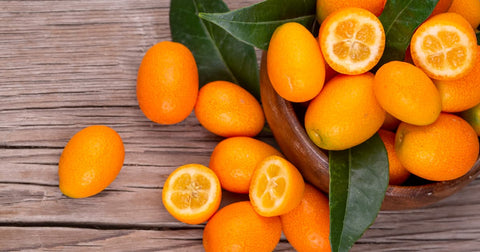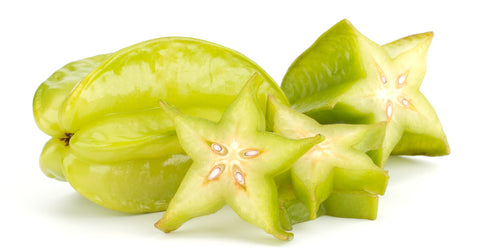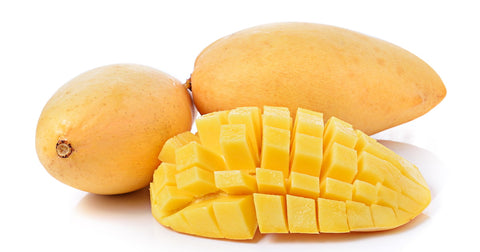Kumquats, those tiny citrus fruits with a surprising twist, are a delightful addition to any diet. But beyond their unique flavor and appearance, kumquats offer a wealth of health benefits, making them a nutritional powerhouse.
If you're looking to add a zesty touch to your meals and snacks, this article explores the 7 key benefits of kumquats, their nutritional value, and how to incorporate them into your diet. We'll also discuss the importance of identifying food intolerances and how our food sensitivity test kit can help you make informed choices about your citrus consumption.

What is a Kumquat?
Kumquats are small citrus fruits that resemble miniature oranges. Unlike most citrus fruits, however, the entire kumquat is edible, including the peel. The peel is actually the sweetest part of the fruit, while the flesh is tart and tangy.
Are Kumquats Good for You?
Yes, kumquats are a healthy and nutritious addition to any diet. They're low in calories and a good source of essential nutrients, including:
-
Vitamin C: A potent antioxidant that supports immune function and skin health.
-
Fiber: Promotes digestive health and helps regulate blood sugar levels.
-
Potassium: An electrolyte that helps regulate blood pressure and fluid balance.
-
Antioxidants: Help protect your cells from damage caused by free radicals.
Kumquat Benefits: A Closer Look
1. Boosts Immunity:
The high vitamin C content in kumquats can strengthen your immune system and help your body fight off infections.
2. Supports Digestive Health:
The fiber in kumquats can help prevent constipation and promote regular bowel movements.
3. May Aid in Weight Management:

Low in calories and high in fiber, kumquats can be a filling and nutritious addition to a weight loss diet.
4. Promotes Heart Health:
The potassium and fiber in kumquats can contribute to heart health by lowering cholesterol levels and regulating blood pressure.
5. Good for Skin:
Vitamin C and other antioxidants in kumquats support collagen production and protect skin cells from damage, promoting healthy, glowing skin.
6. May Help Regulate Blood Sugar:
Some studies suggest that kumquats might help regulate blood sugar levels, making them a potentially beneficial fruit for individuals with diabetes or those at risk.
7. Versatile and Delicious:
Kumquats can be enjoyed whole, added to salads, used in jams and marmalades, or even candied for a sweet treat.
Kumquat Nutrition: A Nutritional Powerhouse
Kumquats are not only delicious but also a nutrient-dense food. One hundred grams of kumquats contains approximately:

-
Calories: 71
-
Carbohydrates: 16 grams
-
Fiber: 7 grams
-
Vitamin C: 44% of the recommended daily intake
How Do You Eat a Kumquat?
The unique thing about kumquats is that you can eat them whole, including the peel! The peel is actually the sweetest part of the fruit, while the flesh is tart and tangy. Simply wash the kumquat thoroughly and pop it in your mouth.
Food Intolerance and Kumquats
While kumquats are generally safe and healthy, some individuals might experience digestive issues after consuming them. This could be due to a food intolerance or sensitivity to citrus fruits.
Food Sensitivity Test Kit: Identify Your Triggers
If you experience digestive discomfort after consuming kumquats or other foods, consider taking a food sensitivity test kit. This can help you identify specific foods that might be triggering your symptoms, allowing you to make informed dietary choices and improve your gut health.
Key Takeaways:

-
Kumquats are a nutritious and delicious fruit with various health benefits.
-
They can be enjoyed whole, including the peel, and are versatile in various dishes.
-
If you experience digestive issues after consuming kumquats, consider a food sensitivity test to identify potential food intolerances.
Remember, this article is intended for informational purposes only and should not be considered a substitute for professional medical advice. If you have any concerns about your health or dietary choices, consult a qualified healthcare professional.
Frequently Asked Questions:
1. Where can I buy kumquats?
Kumquats can often be found in the produce section of grocery stores, especially during the winter months. You might also find them at farmers' markets or specialty Asian grocery stores.
2. How do I store kumquats?
Store kumquats at room temperature for a few days or in the refrigerator for up to a week. You can also freeze kumquats for later use in smoothies or desserts.
3. Are there different varieties of kumquats?
Yes, there are several varieties of kumquats, including Nagami (oval-shaped with a sweet-tart flavor), Meiwa (round-shaped and sweeter), and Marumi (round-shaped with a tart flavor).
4. Can I use kumquats in cooking and baking?
Absolutely! Kumquats can be used in various dishes, from salads and sauces to marmalades and baked goods. Their unique sweet and tart flavor adds a zesty twist to both sweet and savory recipes.
5. I'm experiencing digestive issues after eating kumquats. Could it be a food intolerance?
Yes, it's possible to have a food intolerance or sensitivity to kumquats or other citrus fruits. If you experience symptoms like heartburn, bloating, or diarrhea after consuming them, consider a food sensitivity test to identify potential triggers and make informed dietary choices.


.png?v=1737390083)
.png?v=1737187409)


